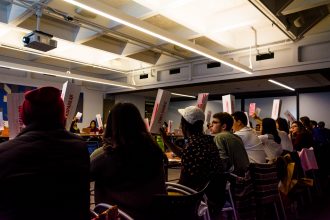Bigots judge people and their actions based on appearances.
But that’s what so-called liberal crusaders are doing under the guise of “political correctness.” We see them everywhere: on internet discussion boards, Facebook, and most commonly, The McGill Daily. They tell us with no basis to believe that people have been discriminated against, despite the fact that discrimination typically requires motive. But this requirement of motive goes by the wayside when the alleged discriminator comes from a “privileged” group, such as whites and/or males. They must be discriminating because of who they are – their logical arguments are immediately discounted. Does this not sound a little ad hominem? Political correctness has gone from being counter-prejudice to a means of prejudice. It’s regressive and shameful.
The war to be politically correct has undermined the stature of this school. SSMU VP Internal Brian Farnan’s forced apology in a listserv over an allegedly racist .gif of U.S. President Barack Obama kicking down a door was an international embarrassment for McGill. And shouldn’t it be? The tenuous charge of racism against the offending email – completely ignoring the accompanying text bemoaning midterms – was predicated on Farnan being part of a privileged group.
It’s hard not to read some of the writing on campus and not ironically feel discriminated against among all the politically correct cries of discrimination. Last year’s McGill Daily piece, “Complicating Space”, claimed that “non-marginalized” people (any combination of: white, male, able-bodied, or heterosexual) were unfairly participating in the school’s anti-discrimination campaign, safe space. It asserted that members of these privileged groups simply didn’t suffer the same amount of bullying or hardship in their lives, if at all. That they are somehow not entitled to safe haven from those things because of who they are. Are we, as a community, supposed to gloss over – to marginalize – an individual’s life experience based on their racial identity, sexuality, or gender? The answer is self-evident.
Outside of school, the extreme politically correct are also abundant, accusing non-marginalized media figures of discrimination in the most superficial way. Programs like Lorne Michael’s Saturday Night Live, Lena Dunham’s Girls, and Jerry Seinfeld’s Comedians In Cars Getting Coffee have drawn ire for their lack (although not absence) of identifiable minorities. Critics claimed this could only result from racism, not from any other hiring policy. When the first two producers attempted to change their shows, and Seinfeld told Buzzfeed race doesn’t factor into his interview list (only who’s the most funny), each fielded cries of racism yet again. But because every complaint is valid in our system of political correctness, all they’ve done is gone from one wrong to another. You’re damned if you do political correctness in any form, it seems.
Political correctness to this extreme is obscene. No question: prejudice and discrimination still haunt us, and they need to be purged. But assuming that some group of people is bound to discriminate, that their actions are bound to be wrong because of who they are – that’s definitely discrimination as well. Do we turn the apparatus of discrimination around to “dominant” non-marginalized groups or do we get rid of it altogether? Two wrongs don’t fix our rights.
To fight discrimination, we must move away from labelling people by their identities. We need to abandon classifying people by their religion, gender, nation, sexuality, or race. Even if these groups roughly indicate social status, privilege, or ability to achieve success as they unfortunately (sometimes) do, it does not give us the right to infer. More than our stereotypical groupings define who we are. The politically correct crowd should listen to Martin Luther King about judging the “content of [one’s] character” rather than stereotyping them. It’s a message that works both ways.
Where discrimination exists, it should be obvious or at least apparent. There should be evidence out there that harm was intended – that opportunities were denied or people were disrespected intentionally due to their identity. Case in point: a provincial government that’s attempting to refuse employment to anyone who visibly identifies with their “foreign” culture and religion. That’s a problem. But otherwise, claiming discrimination when it’s barely plausible ignores the real issues – the real problems to fix.
There is inequality out there. But, unlike what the politically correct say, it doesn’t just come from discrimination. Income inequality, faltering access to education, unjust laws – these all strike across identity divides, although not always equally. And more than just offend, these things hold people from their dreams.
Yes, discrimination is an easy, wide target. It unfortunately still exists. But to charge someone with discrimination requires a modicum of proof. There are other things we should be doing than jumping to blame. If we actually want to break the cycle of prejudice, we can’t be a part of it.
The views expressed in this opinion piece are the author’s own and do not necessarily represent those of The Bull & Bear.


